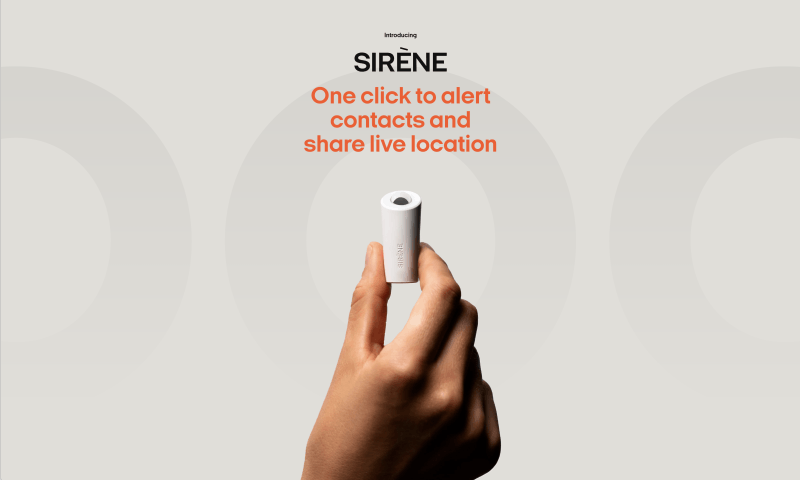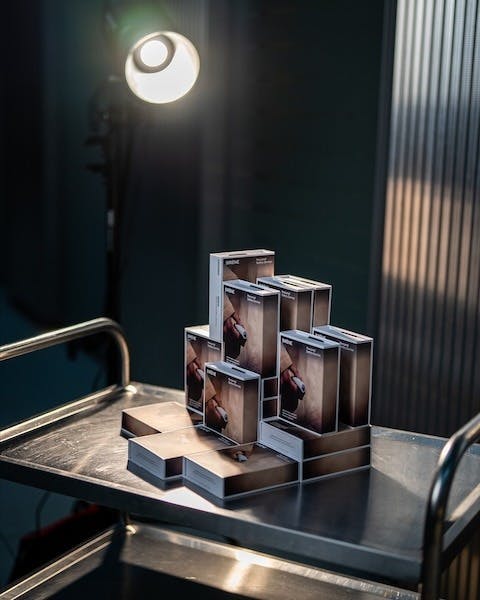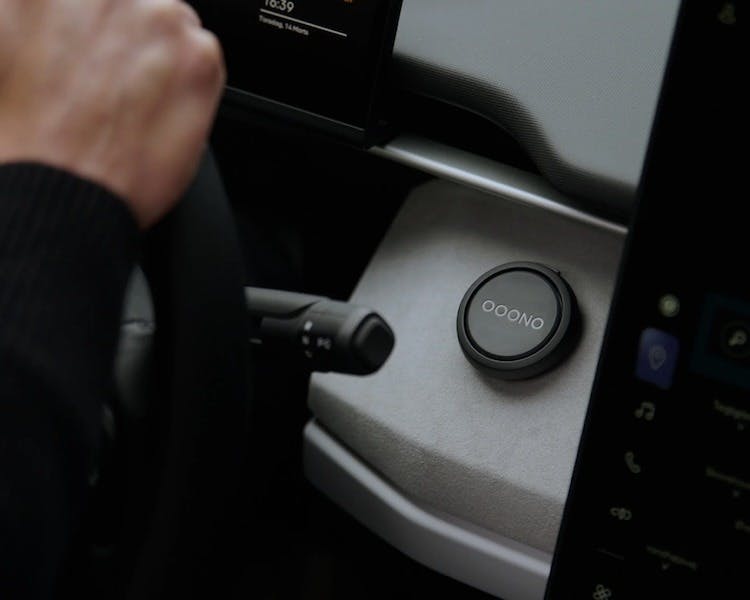How Sirène built trust launching their first product with deferred payment at scale
Sirène sold out of their first product in 36 hours, using the Downpay app to capture pre-orders with automated deferred payments at scale.
Selling out pre-orders in 36 hours with Downpay's automated pay-later feature for Shopify
When new Danish brand Sirène launched their connected personal safety device, the pre-order process on their Shopify store was critical.
If it was clear, fast, and reliable, nobody would think twice about it. Demand would turn directly into thousands of sales. Customers would commit to buying products and then Sirène would charge them when the devices shipped.
But if there were any issues, the positive publicity they'd worked so hard to build up would be lost.
The problem was that Shopify online stores don't natively support charging for sales after the fact, and this functionality was crucial for Sirène. The markets they were launching in legally required that payment for pre-orders had to be postponed until the shipping date.
Sirène also needed a solution that they could trust to capture deferred payment orders at scale, thousands in a short time—then automate collecting payment from all the cards on file.

They found the answer in the deposit and pay-later Shopify app Downpay, resulting in a seamless buying experience.
And Sirène could see the customer confidence they had earned in action as they watched all three production batches sell out over less than two days.
Read on to learn:
- The story behind Sirène
- The challenge they faced building customer trust
- Why they chose Downpay for flexible payments
- How using Downpay enabled a successful launch with satisfied customers
Sirène's story: Calling for help with one click
Reaching for your phone in such a vulnerable situation—it's not as easy as it seems.
— Caroline Louise Lilleør, SIRÈNE
The idea for Sirène came to Caroline Louise Lilleør, founder and brand manager, after she experienced an assault attempt. She was in public but nobody else was around to help.
"I froze, which is very normal for people in that situation. But then luckily I got that strength back," she says. And she was able to fight off her attacker.

Sirène founder and brand manager Caroline Louise Lilleør.
"That's when I found out reaching for your phone in such a vulnerable situation—it's not as easy as it seems."
It could also have prompted her attacker to take her phone. And even if she got through to someone, she'd still have to explain where she was and that she needed help.
An idea to help people in similar situations came to her soon after: a small one-button device, connected to a phone app with a list of contacts who have also installed the app.
Pressing the button on the device would notify the contacts, overriding do-not-disturb settings, and share the phone's location. And if the person calling for help could take out their own phone, they could see what was happening there.
Bringing Sirène to market
Caroline Louise took her pitch to several startup competitions in her home country of Denmark over the next several months. She'd begun building a profile and earning capital, but nowhere near enough to realize her vision.
That is, until Christian Walther Øyrabø heard her interviewed on the radio while he was driving to work—at the Danish tech company OOONO, where he was CEO.
OOONO had already wanted to apply their experience with the CO-DRIVER traffic warning devices to the personal safety field.
So, twenty hours later, Caroline Louise had an email from Christian, and they formalized a relationship soon after. Sirène would be its own brand within OOONO.
This happy coincidence meant that now Caroline's idea would see daylight in the initial markets of Denmark and Germany.
The company's explainer on how Sirène works.
The challenge: Delayed charges, immediate trust
We were a new company. So people needed to flat-out trust us.
— Caroline Louise Lilleør, SIRÈNE
For Sirène's pre-order launch to succeed, the brand had to gain and keep customer confidence.
"We were a new company, so people needed to flat-out trust us," Caroline says.
That meant offering an experience so transparent and reliable that customers didn't have to think about it, and they could just focus on the product.
They had to make the steps clear and keep customers informed. And they had to keep sales flowing without crashes or errors, especially at high transaction volumes.
Sirène also had to handle two sources of complexity in designing the pre-order flow, and smooth out any impact on the customer experience:
- The devices would be manufactured in batches.
- Danish and German laws forbid charging money for a product before shipping it.
They could set up batches within Shopify, using product variants for each shipping date and tracking inventory.
But the Shopify online store only accepts payment up front, which would not be legally permitted.

Sirène boxes ready to go.
Sirène would have to find a third-party solution that extended Shopify's functionality—one that let them secure orders up front but charge customers later.
And for customers to trust them, they had to fully trust this solution.
They had to face the risk that no service they looked at would be acceptable.
"If we couldn't find a solution, it would end up changing our launch completely," Caroline says. "We would end up having thousands of products in stock, not knowing how on earth this launch would go."
But they didn't have to go down this road. They found a Shopify app that met their needs perfectly: the deposit and pay-later app Downpay.
Why Downpay: Seamless deferred payment
It was a no-brainer choosing Downpay, because the founders are former Shopify employees. So they know how that whole system works.
— Caroline Louise Lilleør, SIRÈNE
Sirène's parent company, OOONO, had used Downpay to enable their massively successful CODRIVER-NO2 pre-order launch on Shopify.
With great feedback from OOONO on the service and the relationship, Downpay was clearly the first place to look.

OOONO's CO-DRIVER NO 2 device on the road.
Downpay integrates natively with Shopify, letting merchants set up deposit or pay-later options within the Shopify admin.
Customers can commit to orders while staying in the high-performing Shopify checkout. Merchants can then charge the balance to the card on file later, manually or automatically, authorizing in advance if desired. (Explore how Downpay works yourself in the interactive demo.)
The app also includes optional customer transparency features:
- Displaying custom terms at checkout
- Ending notifications of upcoming payments or payment success/failure through Shopify
- Enabling customer self-service order management tools built into the Shopify order status page
OOONO's experience showed the app could handle large transaction volumes reliably and with high performance. Downpay had processed 15,000 sales for OOONO in the first 15 minutes of the launch.
All of this made a compelling case that Sirène could depend on Downpay to build trust with customers.
It became an even more compelling one for Caroline when she learned about the background of the Downpay team: the majority worked at Shopify, including the two founders.
"It was a no-brainer choosing Downpay, because the founders are former Shopify employees, so they know how that whole system works," she says.
The results: A rapid sellout with no friction
I didn't dream of this good a launch. I didn't dare to.
— Caroline Louise Lilleør, SIRÈNE
Once pre-orders were live, Sirène's customers went through these steps:
- Before launch, sign up to get a notification when pre-orders were available.
- On the launch date, click the link in the notification to visit a Shopify product page.
- Add a Sirène device from a specific batch, with a visible delivery date and payment terms, to their cart.
- Finish checking out, entering payment details for the future charge.
- On the ship date, get a notification of the charge and receive shipping information for their device.
This process happened thousands of times with no surprises—until Sirène sold out the first three batches, 36 hours later. And Sirène received no complaints at all from customers about the process.
Time since pre-order launch
Devices sold
Customer complaints
This is exactly what Sirène wanted—the logistical details of the launch to fade into the background. They had made a big leap in building customer loyalty that would translate into their regular sales post-launch.
"I didn't dream of this good a launch," Caroline says. "I didn't dare to."
When everything had calmed down, Caroline had time to reflect on the experience of launching her first business and bringing a product to market:
"It's learning as you go. So you need to work with people and services that [make it] super easy, and that's what I experienced with Downpay. It worked perfectly—no headaches. I would recommend Downpay in a heartbeat."
Further reading
Check out other case studies to learn how Downpay enables more sales for Shopify merchants.